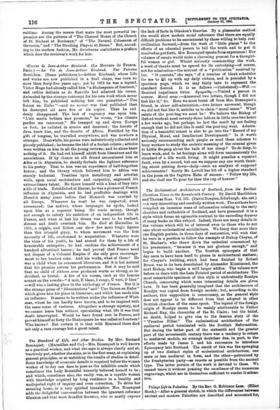(Euvres de Jean - Arthur Rimbaud. (Le Mercure de France, Paris.) —
La Vie de Jean-Arthur Rimbaud. Par Pat-rue Berrichon. (Same publishers.)—Arthur Rimbaud, whose Life and works are now published in a final shape, was born no more than forty-five years ago ; yet by 1873 he was a legend. Victor Hugo had already called him "a Shakespeare of fourteen," and critics delicate as de Banville had admired his verses. Animated by the strange contempt for his own work which never left him, he published nothing but one pamphlet—" Erne Saison en Enfer "—and no sooner was that published than he destroyed all save five or six copies. Then he sad denly disappeared. The lust of vagrancy was upon him. "L'air marin bralera mes poumons," he wrote, "lea climate perdue me tanueront." He tramped up and down Europe on foot; he enlisted in armies and deserted ; the forests of Java knew him, and the deserts of Africa. Fortified by the gift of tongues, he travelled everywhere, and was nowhere a stranger. Meanwhile, his poems were industriously collected and piously published ; he became the idol of a foolish coterie ; articles were written on him in all the young reviews; and he alone knew nothing of it. He had cut himself adrift from literature and its associations. If by chance an old friend encountered him at Aden or in Abyssinia, he sternly forbade the lightest reference to his poetry. That to him was an experience of half-forgotten horror; and the library which followed him to Africa was sternly technical Treatises upon metallurgy and artesian wells, upon naval architecture and carpentry, engrossed his extraordinary talent. He threw himself with a kind of fury into a life of trade. Established at Harrar, he was a pioneer of French influence in Abyssinia, and he had profitable dealings with Menelek many years before that Monarch was courted by all Europe. Wherever he went he was respected, even reverenced ; the natives, whose languages he spoke, looked upon him as a superior being. He made money, though not enough to satisfy his ambition of an independent life in France, and when at last his dream was near to be realised, disease and death overtook him. He died at Marseilles in 1891, a cripple, and fiction can show few more tragic figures than this intrepid gipsy, to whom movement was the first necessity of life, condemned to amputation. Whatever were the vices of his youth, he had atoned for them by a life of honourable enterprise; he had outdone the achievement of a hundred advertised heroes ; he had proved that France need not despair of a Colonial Empire if she only gave encourage- ment to her bravest sons. And his works, what of them ? He was a child when he renounced literature, and it is but natural that his promise outran his performance. But it may be said that no child of sixteen ever produced works so strong, so in- dividual, so brutal. A few of his verses, such as the famous sonnet on the vowels—" A noir, E blanc, I rouge, U vert, 0 bleu" —will win a lasting place in the anthology of France. But it is the strange prose of "Illuminations" and" Une Saison en Enfer " which gives him his place in literature, and which has made him an influence. It seems to be written under the influence of Whit- man, whom he can hardly have known, and to be inspired with the same sense of vastness. Altogether a strange mystery, and we cannot leave him without speculating what life it was that death interrupted. Would he have found rest in France, and proved himself at forty the Shakespeare he was called at fourteen? Who knows ? But certain it is that with Rimbaud there died not only a rare courage but a great talent.


















































 Previous page
Previous page